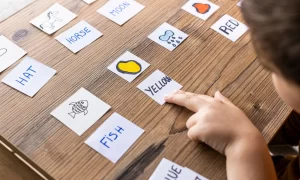G’day!
This is only one among the English greetings you’ll learn from this post.
You’re probably familiar with “hi,” “good morning,” and “hello”. However, there are a lot of other phrases to use to say goodbye and greet to somebody.
Knowing these English greetings can give you a variety in the conversational English and will help you sound more natural.
So let’s take a look!
1. Hey There!
It’s a casual, welcoming method of greeting anyone. You can do it to greet your friends, family members, people whom you are familiar with, or people with whom you’ve an amiable relationship with.
It can also be used to communicate with strangers you don’t know but wish to look friendly. The staff members of most cafes in London will say, “Hi there!”
Example:
Speaker A: “Hey there! What can I do to help you?”
Speaker B: “Hi! Do you want to get me a hot chocolate, please?”
2. What’s Up?
Have you ever wondered why messaging application WhatsApp is referred to as WhatsApp? It seems that Jan Koum, one of the co-founders, chose WhatsApp. The app was named by WhatsApp in order to sound similar to “what’s up”, which is a slang phrase you can use to inquire about someone’s present situation.
It’s no wonder that a lot of text conversations I initiate with my buddies on WhatsApp begin with me asking, “What’s up, buddy?”
Although it might seem like an inquiry, it is usually used more of an opportunity to simply say “hello” than a genuine concern about someone’s health or actions.
Therefore, you don’t need to answer “What’s up?” with an extensive explanation of everything your doing. It’s enough to respond, “All good” or “Not much”.
Example:
Speaker A: “Hey, what’s up?”
Speaker B “Not too much. Just sitting at home. Do you agree?”
3. Howdy! /’haUdi/
Howdy is a different casual greeting used widely in English-speaking areas particularly those in southern United States.
The word originates from the expression “How do ye?,” which was popular in the late sixteenth-century England in order to find out about other peoples health. But, as with “What’s up?”, people often use it to be a way to greet someone and not as a way to find out how well you’re doing.
Example:
Speaker A: “Howdy! What’s up with you today?”
Speaker B: “Hi! So far, it’s been pretty good so far. Thank you for the question.”
4. G’day Mate!
That’s what Australians (people who are from Australia) are known to say Down Under (Australia). It’s an informal way of greeting people and is very popular in the home of the kangaroos.
“Mate” is an informal word used to mean “friend”. But what’s the “G” + the apostrophe?
I’ll give you an idea. Australians like to shorten words. For example “service station” becomes “the servo”, “arvo” signifies “afternoon,” and “breakfast” changes to “brekkie.” Guess what “good” becomes then!
Here’s a quick example
Speaker A: “G’day mate!”
Speaker B: “Hi!”
Are you looking you to say “G’day mate” as an Aussie? Watch the YouTube video Pete of Aussie English made for you.
5. Sup Bro!
“Sup bro!” is an slang term that is commonly used by friends, particularly those in New Zealand.
“Sup” is short for “What’s up?” while “bro” is a colloquial term that stands for “brother”. As you can imagine, it’s an extremely informal way to say hello to your loved ones.
Speaker A: “Sup bro!”
Speaker B: “Sup!”
6. Yo! /joU/
Here’s a different slang term to greet people. This is typical American English usage and was popularized because of the Italian-American community that lived in Philadelphia, USA, in the 1940s.
Have you ever watched or watched the Rocky films? Rocky Balboa is an Italian-American boxer who hails from Philadelphia and he is a fan of the show often!
7. Alright?
“Alright?” is a informal and abbreviated version of “Are you alright?” or “Are you doing alright?”
It can be used as a casual, friendly method to inquire whether everything is in order or to greet someone in place or in place of “hello”.
Speaker A: “Alright?”
Speaker B: “Alright! How’s the situation going?”
8. How Have You Been?
This is a different method of saying “How are you?” to make use of in casual or informal environments.
Speaker A: “Hey, John! What’s been up to?”
Speaker B: “Hey, Sarah! I’ve been fantastic, thank you for contacting me. Do you agree?”
9. Long Time No See!
There are occasions that you’re glad to see someone you’ve not seen for a while which is why this can be a wonderful phrase to use to let them know you’re happy to be seeing them again.
Speaker A: “Hey, Olly! It’s been a while since I saw you! How are you doing?”
Speaker B: “Hey, Cara! It’s been a long time! I’ve been amazing! You too?”
10. How Do You Do?
You might think, “How do I do what? !”
Don’t worry, nobody will be asking questions what you do. This is a formal way of saying hello.
It’s likely something is the British monarchy would employ in greeting officials from all over the globe.
The best part with this situation is you can respond by rephrasing the question. For example:
The Speaker: “How do you do?”
Speaker B “How do you do?”
It’s weird, I know.
11. See/Catch You Later/Soon!
If you and someone else break up, you are able to simply let them know that you’re saying “See you later” even when you don’t have a intention of seeing that person next time.
It is a courteous way to end your day and you can use it in formal and informal situations.
Speaker A: “Well, I should begin right now. We’ll see you in a few minutes!”
Speaker B “Sure I’m taking care! Come back soon!”
12. See You/Ya!
“See ya!” is like “see you later” but more casual (“ya” is a slang term meaning “you”).
Speaker A: “I need to go you guys! See ya!”
Speaker B: “See ya!”
13. Have A Good One!
This is my favorite way to say goodbye.
It’s short for “Have a good [day/evening/weekend/etc. “,” which means it can be used in a myriad of settings – both formal and informal. It’s a remarkably flexible expression.
Speaker A: “I’m leaving. Enjoy your time!”
Speaker B: “Thanks! You too.”
14. Bye For Now
This can be used when you are certain that you’ll visit the person soon.
Speaker A “OK You can go home to take a shower. I’ll see you later. Goodbye for now.”
Speaker B “Okay, see you later.”
15. Enjoy The Rest Of Your Day/Night
Do you not love this idea? It’s a nice and courteous way to say goodbye and sends a positive message to the person you’re letting go. Beautiful phrase.
The Speaker: “Thanks for coming to the meeting Everyone. Have a great rest of the day.”
Speaker B and C: “Thanks, Mark. And you too. Bye!”
16. I’ll See You Around
There are instances that you aren’t sure whether you’ll see someone again since you reside in different cities or perhaps you’re aware that it’s unlikely that you’ll meet the same person in the future. In this situation you could make a promise like “I’ll see you around”.
I like this word since “around” could mean many things. It could mean around town or around the office or even all over the world!
The speaker: “It was great chatting with you. I’ll see you again!”
Speaker B “Yeah I’ll see you in the next few minutes. Bye!”
17. So Long
“So long” is an informal and casual way of saying goodbye. It’s a cryptic phrase, however. Why do we have to use two phrases? What’s the reason for them being so long? Why is it so long? Hmm…weird.
Some claim it’s from Ireland Others claim that it’s a form of Americanism. If you’re keen to know more information about this, can read this article.
Speaker A: “Well, I should be headed my way. So long!”
Speaker B “Bye bye. So long!”
18. Take Care
Care for what? Make sure you take care of your self, naturally! This is the reason you can employ this expression when you wish to convey your wish for someone’s health. Here’s an example of how you could make use of it.
Speaker A: “Well, I’ll see you in the near future. Be careful!”
Speaker B “Thank you! You too. Be careful!”
You can utilize “take care” in formal and informal contexts.
19. Ciao!
The great aspect of languages is that they’re extremely generous. They loan and lend phrases and words constantly without needing deposits. English has borrowed a lot of words over time as well “ciao” is just another one of them.
Italians make use of it to signify hello and good bye. “Ciao” works in both instances in Italy However, English the English language, people use it only for leaving and saying goodbye.
Speaker A: “Alright, I need to go right now. Ciao!”
Speaker B “Take care! Ciao!”
“Ciao” is informal. I would not use it with anyone I do not have a good connection with.
20. Take It Easy
It’s a great method to leave a lasting impression. If you’re leaving someone, you could utilize “take it easy” as an informal way to convey your wish that they relax, care for themselves, or enjoy the time of their lives without stress.
It can be used in a variety of situations. It is often used to describe a laidback and relaxed manner of life.
The speaker: “Well, I’ll see you again. Relax!”
Speaker B: “Thanks! You too. Be careful!”
English Greetings
It’s all right! How do you feel about this collection of English greetings? Did you pick up new ones?
Another option to broaden your vocabulary of greetings can be to go through short stories written in English. They are generally filled with direct language therefore it’s likely you’ll come across something similar to this:
“I must go now,” John said. John who was looking depressed.
“OK, take care, my friend.”
Then why do you not adhere to the rules of StoryLearning approach and take a look at English textbooks in which you’ll be able to see these greetings being used?
Could this not be a good method of learning?
I hope that you’ll give it a shot! Also, I hope to “see” you again on my blog, so I’ll only say, “Bye for now!”



+ There are no comments
Add yours